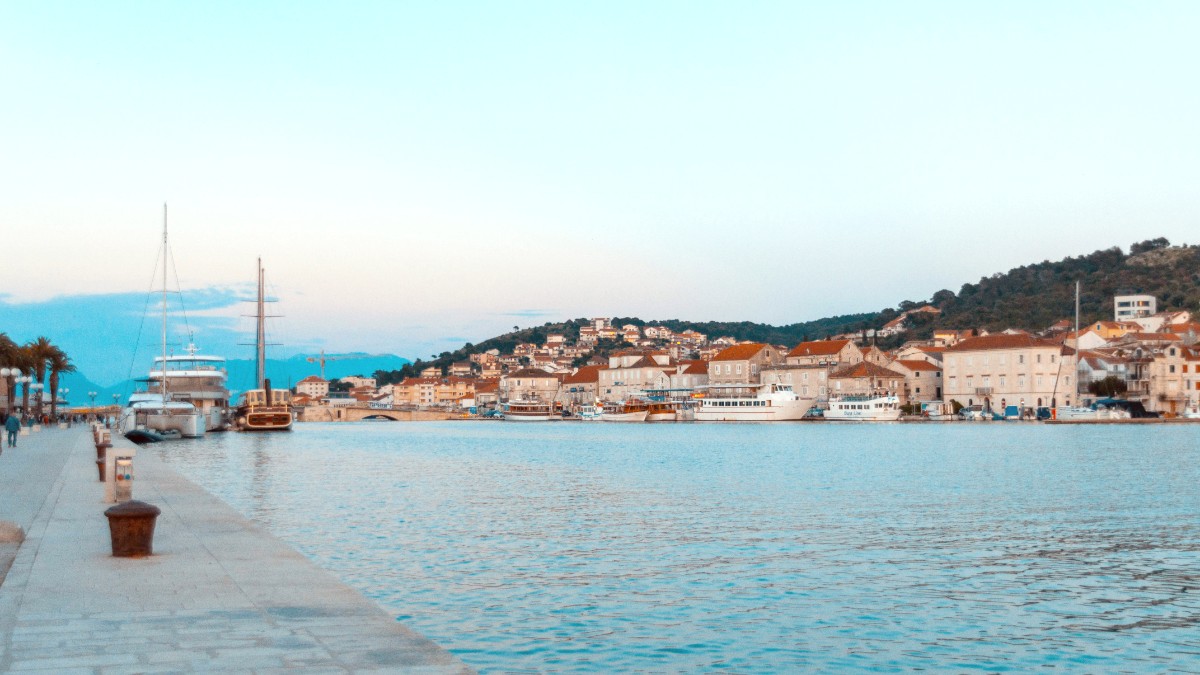
Dalmatia, Croatia
Summers (June to August) are typically hot and dry. Average daily temperatures range from 25°C to 30°C (77°F to 86°F), often rising above 30°C (86°F) during heatwaves. Sea temperatures are warm, usually around 24-26°C (75-79°F), making these months ideal for swimming and beach activities. Humidity levels are moderate. Precipitation during summer is minimal, with clear skies dominating.
Spring (April-May) and Autumn (September-October) bring mild temperatures. Daily averages typically fall between 15°C and 25°C (59°F to 77°F). These shoulder seasons offer comfortable conditions for sightseeing and outdoor activities. Rainfall starts to increase in autumn, specifically in October. Winters (November to March) are mild and wet. Average temperatures range from 8°C to 15°C (46°F to 59°F). Snow is a rare occurrence.
Each season in Trogir offers a different travel experience, with unique advantages and disadvantages.
For specific activities, certain periods are more suitable: Beach & Swimming (June to early October), Sightseeing & Cultural Exploration (April, May, September, October), Sailing & Boating (May to September), Hiking & Cycling (April, May, October), Budget Travel (November to March).
June - August
Ideal weather for swimming and sunbathing. All attractions and services operate at full capacity.
Very crowded. Prices for accommodation, flights, and tours are at their highest. Parking is difficult and expensive.
April-May & Sep-Oct
Temperatures are pleasant. Crowds are fewer. Prices are lower. Sea remains warm in September.
Some smaller seasonal attractions may have shorter hours. Sea might feel cooler in April/May. Rain chances in late autumn.
November - March
Very few tourists. Prices are at their lowest. Mild weather for comfortable exploration of the historic town.
Many tourist-oriented businesses close. Ferry schedules are reduced. Cooler temperatures and higher chance of rain.
Summers, from June to August, are typically hot and dry. Average daily temperatures range from 25°C to 30°C (77°F to 86°F), often rising above 30°C (86°F) during heatwaves. Sea temperatures are warm and inviting, usually around 24-26°C (75-79°F), making these months ideal for swimming and beach activities.
Humidity levels are moderate, generally making the heat manageable, though the midday sun can be intense. Precipitation during summer is minimal, with clear skies dominating. These conditions make Trogir a classic summer vacation destination.
Daily averages 15°C to 25°C (59°F to 77°F). Good for sightseeing. Rainfall starts to increase in autumn.
Warm sea temperatures linger from summer, enjoyable for swimming.
November to March, average 8°C to 15°C (46°F to 59°F). Mild and wet, snow is rare.
Cultural exploration, museum visits, quiet walks. Fewer tourist businesses open.
Blossoming nature and refreshing conditions for outdoor activities.
Croatia is part of the Schengen Area, impacting entry procedures for many nationalities.
Non-EU/EEA nationals who are not visa-exempt will need a Schengen visa (Type C - Short Stay). This visa permits stays of up to 90 days within any 180-day period across the entire Schengen Area.
Gathering the correct documents is a step for entry.
Croatia uses the Euro, simplifying currency considerations.
Croatia adopted the Euro (EUR, €) on January 1, 2023. This is the official currency for all transactions. Obtaining Euros from ATMs (bankomati) in Trogir or Split is generally the best approach. ATMs offer competitive exchange rates.
Prices fluctuate significantly based on the season, with higher costs during peak summer months.
Tipping is not mandatory in Croatia but is appreciated for good service.
Croatia is a generally safe country, but it helps to be informed.
The general emergency number in Croatia is 112. This number connects you to police, ambulance, and fire services.
Trogir has a health center (Dom zdravlja Trogir) for general medical needs.
For serious emergencies, transfer to Split Clinical Hospital Center (KBC Split).
Comprehensive travel insurance is highly recommended for all travelers, especially non-EU citizens.
A policy should cover medical emergencies and evacuation. World Nomads, SafetyWing, Insubuy are options.
It should cover trip interruption/cancellation and lost/stolen luggage.
Trogir is generally a very safe destination. Violent crime is rare. Petty crime like pickpocketing can occur in crowded places.
Remain aware in markets, bus stations, and busy Old Town streets. Keep valuables secure in a Money belt.
Forest fire risk increases during hot, dry summers. Pay attention to local warnings.
| Service | Number | Notes |
|---|---|---|
| General Emergency | 112 | Connects to Police, Ambulance, Fire |
| Police | 192 | Direct police line |
| Ambulance | 194 | Direct ambulance line |